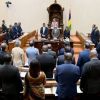
Nearly 10% of Mauritian exports are sourced by the USA. This sizeable market also provides a lifeline to many companies operating in the ICT and BPO sector. With the election of Donald Trump, dark clouds linger over the future of America’s trade policy.
Publicité
Donald Trump’s election to the most powerful job in the world has been worrying people. His stance during the campaign for the presidential election in the United States has left many bewildered and his possible victory was perceived as a spectre over the global economy. Analysts of all sorts claimed such an outcome might tip the world over to another recession – following that of 2008.
Come Wednesday 9 November, the world woke up with a “fait accompli” as The Donald made it past Hillary Clinton and clinched a surprising victory despite his sometimes vitriolic speeches. So what does President-elect Donald Trump has in store for the world? The initial reactions of the markets was a long plunge. US stock markets went into a selling frenzy, followed by Asian ones while the Mexican peso nose-dived.
Overtly protectionist of American industry in his speeches, Trump scared businesses across the globe who feared a new era of protectionism that would derail world trade. According to most economic commentators, globalisation in itself is dead and the outcome of the US presidential elections confirm a new normal, where populations and the political elite seek to protect their own economies from the effects of globalisation.
One of the most important components of globalisation and a direct offshoot of it, is world trade which gives hope to countless developing countries of achieving higher levels of earnings through trade. However, according to a report by the World Trade Organisation released on Thursday 10 November, a total of 85 new trade-restrictive measures were implemented by G20 economies from mid-May to mid-October 2016. This is an average of 17 new measures per month, down from 21 per month imposed in mid-October 2015 to mid-May 2016. This slight decline represents a return to recent trend levels after a peak in the first half of 2016.
“The steady accumulation of trade-restrictive measures since the financial crisis has gradually increased the share of global trade affected by such restrictions. As of the most recent reporting period the share of world imports covered by import-restrictive measures implemented since October 2008 and still in place is 5% and the share of G20 imports covered is 6.5%,” says the WTO.
In this new era of protectionism, Mauritius being an exporter of goods and services has to find a place for itself. The country has huge export driven businesses such as textiles and ICT. Even though 47% of our exports are destined to the European market, according to figures from Statistics Mauritius, 10.4 per cent. Total exports to the USA for the first six months of the year stood at Rs 4.1 billion, having decreased by 21 per cent as compared to the first six months of 2015.
Any change in the international trade policy of the USA will have an impact over Mauritius, however, the country still benefits from the Africa Growth and Opportunity Act (AGOA) which has been extended by Congress for another ten years in 2015.
 Rajiv Seervansingh: “Direct and indirect impacts”
Rajiv Seervansingh: “Direct and indirect impacts”
Economist Rajiv Seervansingh explains that the presidency of Donald Trump has both a direct and indirect impact on the economy. “Nothing as such will change with Donald Trump being the President of the USA. We mostly deal with the USA via the AGOA. There is no direct threat to our economy. Exportations through the AGOA will continue,” he says. Commenting on the indirect impact which might affect Mauritius, he adds: “We still need to figure out Trump’s political and economic policies. If the President-elect decides to scrap the various deals on imports, it will have a negative impact on international trade. Then Mauritius might be affected by this. If the dollar depreciates, exports will suffer as exporters will get less revenue.”
 Arvind Nilmadhub: “No choice but to wait”
Arvind Nilmadhub: “No choice but to wait”
Arvind Nilmadhub shares the same opinion. The economist argues that the direct impact on the Mauritian economy will be definitely associated with the depreciation of the dollar. “Firstly, the balance of trade will be impacted. Mauritius will be getting less revenue when exporting through AGOA.” He further highlights that Trump tends to favour protectionism and is not willing to carry business with foreign countries. “If the AGOA knows any change, then Mauritian enterprises might be affected. Many companies might close their doors and there will be job losses. Various sectors might be affected like textiles, BPO and ICT. But all these depend on Trump’s policies. We have no choice but to wait.” Arvind Nilmadhub is also optimistic about the opportunities that exist. “There can be a few opportunities that the government must exploit. For instance, Mauritius must encourage US and UK investors to pass through Mauritius to invest in Africa. This can be an opportunity for Mauritius.”
COMMENTS FROM AROUND THE WORLD
Even if trade agreements like the Trans-Pacific Partnership and the Transatlantic Trade and Investment Partnership fail and economic globalisation slows, technology is promoting ecological, political, and social globalization in the form of climate change, transnational terrorism, and migration – whether Trump likes it or not. World order is more than just economics, and the United States remains central to it.
Joseph S. Nye, Jr. Professor at Harvard University
Trump’s victory jeopardizes world trade. Trump has promised to ditch the 12-country Trans-Pacific Partnership, impose punitive tariffs on Chinese imports, and unilaterally renegotiate the North American Free Trade Agreement. This is the last thing the world needs right now, given that trade – and the global economy itself – is already struggling.
Carl Bildt – Former Swedish Foreign Minister
Such an agenda would not only threaten a global recession. It would also tempt regions to split into rival trading blocs – a worrying prospect for a post-Brexit Britain seemingly intent on tearing itself away from the European Union to go it alone. In Asia, the collapse of the TPP, from which the Obama administration unwisely excluded China, paves the way for the Chinese to build their own trading bloc.
Philippe Legrain – Senior Fellow at the London School of Economics
Lilowtee Rajmun: “His objective is to protect the domestic market”
The Director of MEXA points out that one of the main focus of Donald Trump’s electoral campaign was his anti-trade stance. As Lilowtee Rajmun explains, “he stated that he will be reviewing existing long term trade agreements with Canada and Mexico and the trade agreement with China. He also said no to the trade agreement between the US and Vietnam. His objective is to protect the domestic market. So out of his protectionist view, he wants to promote an anti-trade climate.” She trusts that it is quite annoying for those countries.
 On a more optimist note, Lilowtee Rajmun highlights that the African Growth and Opportunity Act (AGOA) has been renewed for ten years in July last year. “So we still have nine years to go. Moreover during his campaign, Donald Trump did not mention anything about Africa and the AGOA. So, I believe this is an opportunity for Mauritius. As they are saying no to our big competitors, what will happen to the US buyers? They will have to follow the government’s policy and they will have to be very careful regarding what other options they have left. They will have to trade with other countries. Trump has not said anything about India, Bangladesh or Africa. I trust that they will come back to us as it is a no danger zone.”
On a more optimist note, Lilowtee Rajmun highlights that the African Growth and Opportunity Act (AGOA) has been renewed for ten years in July last year. “So we still have nine years to go. Moreover during his campaign, Donald Trump did not mention anything about Africa and the AGOA. So, I believe this is an opportunity for Mauritius. As they are saying no to our big competitors, what will happen to the US buyers? They will have to follow the government’s policy and they will have to be very careful regarding what other options they have left. They will have to trade with other countries. Trump has not said anything about India, Bangladesh or Africa. I trust that they will come back to us as it is a no danger zone.”
However, the Director of MEXA underlines that we must not rejoice too quickly. “We still have to be careful because after year 2025, the AGOA will not be renewed. So we will have to negotiate a new trade agreement years beforehand and we could still be under Donald Trump’s mandate. So that might become problematic.”
Maurice Vigier de La Tour is a well-known figure in the local manufacturing sector and he has worked intensively on the AGOA case for Mauritius. He says that Donald Trump never mentioned anything about the AGOA. “In fact he talked about the North American Free Trade Agreement (NAFTA) and the Trans-Pacific Partnership (TPP) which was never ratified and is still lying on the Congress table.” According to him, the TPP will be most likely be sidelined by the new administration. However, this is an advantage for Mauritius given that Sub-Saharan African countries will benefit from such a situation. “Countries like Vietnam propose the same products as Mauritius and they are set to lose from the non-adoption of the TPP.” Regarding potential adverse economic impacts on the country, Mr Vigier de La Tour says that even though the US dollar initially lost ground following the election results on Wednesday, it has since rebounded, same with the Dow Jones. “We will have to wait and what are his policies and what is the team around him all about.”
A worrying electoral outcome, says LALIT
According to left-wing political party LALIT, Trump’s election is worrying as he is someone who has said and also done, very dangerous things even before. The political party highlights that the backbone of his success is that he has gathered the support of what he, himself, calls ‘the working class.’
“And yet it is this economic identity, being part of the class that relies for survival on a job, is the identity that, in the final analysis, counts. He used this to his populist ends, certainly not in the fight for socialism. But, when people are desperate, they follow this kind of appeal, even if it is from a strange quarter, simply because it recognizes their class suffering.”
The piece, signed by Lindsey Collen for the party, says that they have noted that following his election, Trump’s victory speech is “100% Keynes”. “He will invest in roads, bridges, infrastructure and so on and, in building, will “employ Americans”. So he says. Since we cannot expect him to decrease military spending – he has promised to double it – and he says he will decrease taxes, he can only be relying on the Keynsian multiplier effects of a Government spending money that does not yet exist. This is not easy for a State as indebted already as the US state,” they underlined.
According to Lindsey Collen, the election of Trump following Brexit vote and the relative rise in popularity of right-wing parties in Europe, and also in places like India, Brazil, Egypt, and the Philippines, “is a symptom of the economic and social crisis of present-day capitalism, and the lack of a mass movement being constructed around a proper socialist challenge. At least the Sanders movement in the working class and amongst young people, coming after other mass movements in the US over the past 5 – 10 years, like the Occupy Wall Street movement, is a sign of hope.”
LALIT trusts that the time is ripe for the building and popularising of organisations that can express working class power. “LALIT is working on it. This is why we put so much emphasis on working class organization and a working class program: it is the way to oppose the right-wing populists like Trump and the way to build a genuinely democratic and socialist future,” says Lindsey Collen.
Thousands protest election results
A report by right-leaning Fox News channel, said that thousands of people coast-to-coast took to the streets Wednesday night to protest Donald Trump’s election, disrupting traffic, chanting anti-Trump slogans and some ending up in handcuffs.

From New England to heartland cities like Kansas City and along the West Coast, demonstrators bore flags and effigies of the president-elect, disrupting traffic and declaring that they refused to accept Trump’s victory. Los Angeles demonstrators also beat a Trump piñata and sprayed the Los Angeles Times building and news vans with anti-Trump profanity.
In Oakland, several thousand people gathered in Frank Ogawa Palaza, police said, clogging intersections and freeway on-ramps. According to KTVU, police used tear gas to disperse protesters after an unlawful assembly was declared. In Manhattan about 1,000 people protested. Outside Trump Tower on Fifth Avenue in midtown, police installed barricades to keep the demonstrators at bay.
“America is not voting for Donald Trump’s policies, which don’t exist,” one protester told the station. “They voted for sexism, racism, xenophobia, anti-Semitism.” Other protesters echoed “Not my president” chants, which had been heard in several cities across the U.S.
In Chicago, several thousand people marched through the Loop. They gathered outside Trump Tower, chanting “Not my president!” Hundreds of protesters gathered near Philadelphia’s City Hall despite chilly, wet weather. In Boston, thousands of anti-Trump protesters streamed through downtown, chanting “Trump’s a racist” and carrying signs that said “Impeach Trump” and “Abolish Electoral College.”

Notre service WhatsApp. Vous êtes témoins d`un événement d`actualité ou d`une scène insolite? Envoyez-nous vos photos ou vidéos sur le 5 259 82 00 !













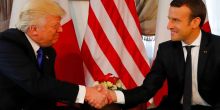
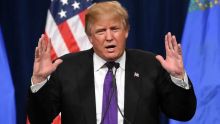

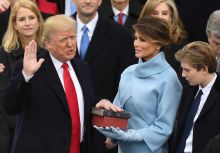
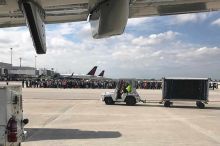
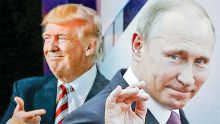
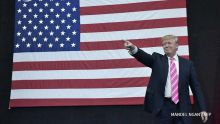
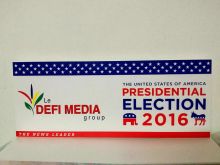
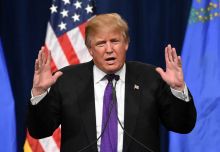

![[Blog] Gudhi Padwa : A joyous start to the New Year](https://defimedia.info/sites/default/files/styles/medium/public/gudi_thumb.jpg?itok=BzpMZrT8)





